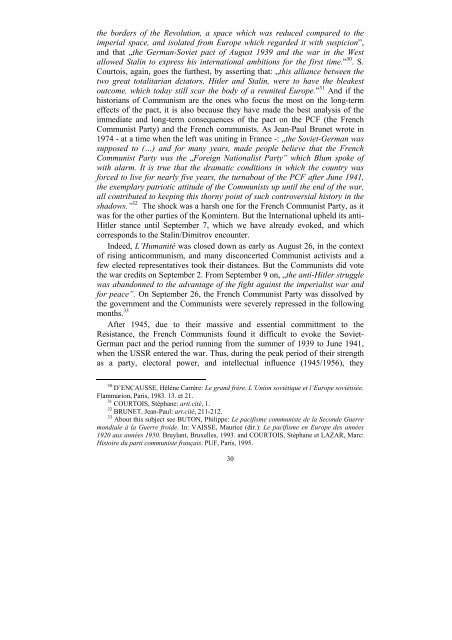The Molotov-Ribbentrop Pact - ELTE BTK Történelem Szakos Portál
The Molotov-Ribbentrop Pact - ELTE BTK Történelem Szakos Portál
The Molotov-Ribbentrop Pact - ELTE BTK Történelem Szakos Portál
You also want an ePaper? Increase the reach of your titles
YUMPU automatically turns print PDFs into web optimized ePapers that Google loves.
the borders of the Revolution, a space which was reduced compared to the<br />
imperial space, and isolated from Europe which regarded it with suspicion”,<br />
and that „the German-Soviet pact of August 1939 and the war in the West<br />
allowed Stalin to express his international ambitions for the first time.” 30 . S.<br />
Courtois, again, goes the furthest, by asserting that: „this alliance between the<br />
two great totalitarian dctators, Hitler and Stalin, were to have the bleakest<br />
outcome, which today still scar the body of a reunited Europe.” 31 And if the<br />
historians of Communism are the ones who focus the most on the long-term<br />
effects of the pact, it is also because they have made the best analysis of the<br />
immediate and long-term consequences of the pact on the PCF (the French<br />
Communist Party) and the French communists. As Jean-Paul Brunet wrote in<br />
1974 - at a time when the left was uniting in France -: „the Soviet-German was<br />
supposed to (…) and for many years, made people believe that the French<br />
Communist Party was the „Foreign Nationalist Party” which Blum spoke of<br />
with alarm. It is true that the dramatic conditions in which the country was<br />
forced to live for nearly five years, the turnabout of the PCF after June 1941,<br />
the exemplary patriotic attitude of the Communists up until the end of the war,<br />
all contributed to keeping this thorny point of such controversial history in the<br />
shadows.” 32 <strong>The</strong> shock was a harsh one for the French Communist Party, as it<br />
was for the other parties of the Komintern. But the International upheld its anti-<br />
Hitler stance until September 7, which we have already evoked, and which<br />
corresponds to the Stalin/Dimitrov encounter.<br />
Indeed, L’Humanité was closed down as early as August 26, in the context<br />
of rising anticommunism, and many disconcerted Communist activists and a<br />
few elected representatives took their distances. But the Communists did vote<br />
the war credits on September 2. From September 9 on, „the anti-Hitler struggle<br />
was abandonned to the advantage of the fight against the imperialist war and<br />
for peace”. On September 26, the French Communist Party was dissolved by<br />
the government and the Communists were severely repressed in the following<br />
months. 33<br />
After 1945, due to their massive and essential committment to the<br />
Resistance, the French Communists found it difficult to evoke the Soviet-<br />
German pact and the period running from the summer of 1939 to June 1941,<br />
when the USSR entered the war. Thus, during the peak period of their strength<br />
as a party, electoral power, and intellectual influence (1945/1956), they<br />
30<br />
D’ENCAUSSE, Hélène Carrère: Le grand frère. L’Union soviétique et l’Europe soviétisée.<br />
Flammarion, Paris, 1983. 13. et 21.<br />
31<br />
COURTOIS, Stéphane: arti.cité, 1.<br />
32<br />
BRUNET, Jean-Paul: art.cité, 211-212.<br />
33<br />
About this subject see BUTON, Philippe: Le pacifisme communiste de la Seconde Guerre<br />
mondiale à la Guerre froide. In: VAISSE, Maurice (dir.): Le pacifisme en Europe des années<br />
1920 aux années 1950. Bruylant, Bruxelles, 1993. and COURTOIS, Stéphane et LAZAR, Marc:<br />
Histoire du parti communiste français. PUF, Paris, 1995.<br />
30













